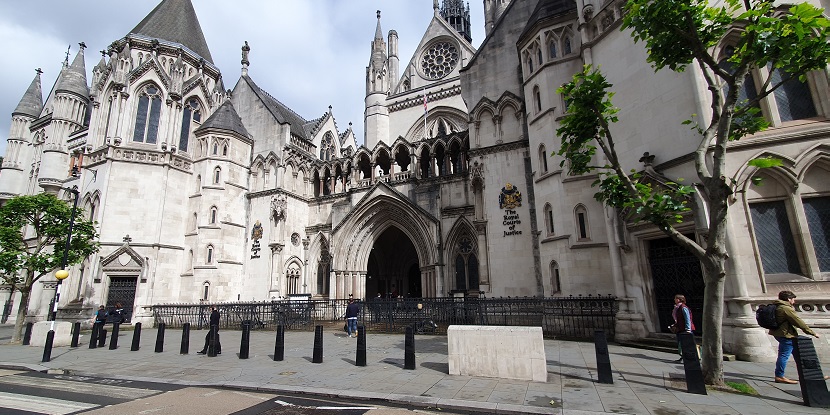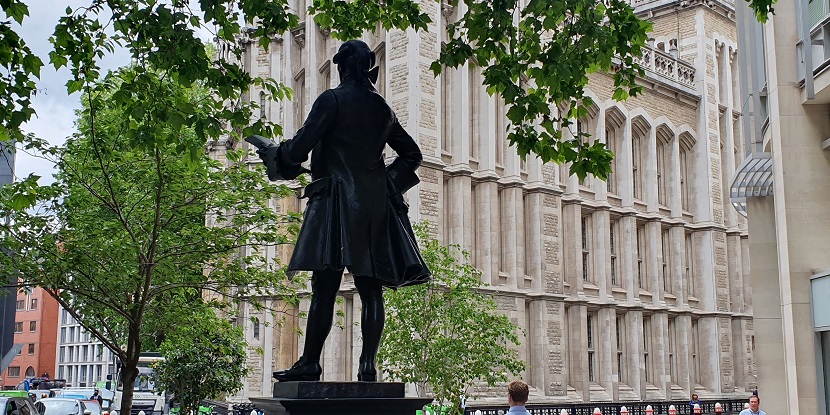The top cases that have impacted the UK patent litigation market
Disputes over SEP portfolio licences, such as Ericsson vs Lenovo, have dominated the UK patent courts over the past year. As the latest JUVE Patent UK ranking shows, top-tier law firms benefited most from this trend. Revocation actions for the pharmaceutical industry forms an additional mainstay.
2 April 2025 by Mathieu Klos
Stable case numbers and numerous high-profile SEP portfolio licence disputes perfectly summarise the past year at the UK patent litigation courts. These include the UK High Court and the Court of Appeal, as well as the Intellectual Property and Enterprise Court (IPEC), which hears small and medium-sized cases across diverse fields of technology.
The first-instance courts have recently seen a multitude cases concerning SEP licence rates. The corresponding judgments in disputes such as InterDigital vs Lenovo, Panasonic vs Xiaomi and Oppo, and Tesla vs Avanci and InterDigital attracted considerable attention.
“UK courts have positioned themselves as the go-to destination for FRAND rates”
The past year’s developments point to one conclusion: the UK courts have successfully positioned themselves as the go-to destination for FRAND-rate determinations. Implementers now routinely apply here for determination of SEP portfolio licence rates. Furthermore, they are attempting by increasingly creative means — such as interim licence applications — to focus the action in London and thwart the threat of injunctions from German courts and the UPC. Although continental courts have so far been largely unimpressed by this tactic, UK law firms are benefiting from the rise in such cases.
Ever larger cases
SEP disputes have become much more extensive. In the past, trials for injunctions and technical trials usually came first, followed later by a FRAND trial. Now, however, the FRAND trial precedes the technical trials due to the new “FRAND first” doctrine.
Furthermore, there are now frequently jurisdictional challenges, in which the SEP holder disputes the UK court’s jurisdiction to determine a licence rate. Applications for interim licences have also become standard practice in SEP disputes.

The UK Court of Appeal ©Mathieu Klos/JUVE Verlag
Last year, Xiaomi successfully obtained an interim licence from Panasonic with the help of Kirkland & Ellis. A corresponding order from the UK Court of Appeal quickly led to consensus between the two companies on the broad outlines of a licence agreement. Subsequently, an oral hearing scheduled at the Mannheim local division a few days later never took place. Bristows represented Panasonic in this landmark case, while Pinsent Masons acted for Oppo.
“To be at the forefront of the market, firms need to take part in SEP disputes”
FRAND-rate disputes have become the flagship of UK patent litigation. It is mainly Chinese implementers, such as Lenovo, Xiaomi, and Oppo, asking the High Court to set such rates. Last year, Kirkland & Ellis’ patent team represented Lenovo and Xiaomi in high-profile cases. This strong presence will continue in the coming months as the US firm will feature in new cases such as Samsung vs ZTE and Mediatek vs Huawei.
Whenever InterDigital appears as SEP holder in such proceedings, its regular advisers Gowling WLG and Bird & Bird are involved. For example, in the landmark case against Lenovo concerning the calculation of a FRAND rate, or against Tesla concerning a pool licence rate.
To be at the forefront of the UK patent litigation market, firms need to take part in such SEP disputes. Examples include Bristows for Panasonic, Powell Gilbert for Tesla and Taylor Wessing for Ericsson.
Key SEP battles in 2024
- InterDigital (with Gowling WLG and Bird & Bird) vs Lenovo (with Kirkland & Ellis) at the Court of Appeal over 3G, 4G and 5G portfolio licence, including FRAND-rate determination (partially settled in 2024)
- Panasonic (with Bristows) vs Xiaomi (with Kirkland & Ellis) and Oppo (with Pinsent Masons) at the High Court and Court of Appeal over WCDMA and LTE standards, including interim licence dispute (settled in 2024)
- Lenovo (with Kirkland & Ellis) vs Ericsson (with Taylor Wessing and Pinsent Masons) at the High Court and Court of Appeal over FRAND-rate determination for Ericssons’ 4G and 5G portfolios, including interim licence dispute (ongoing)
- Tesla (with Powell Gilbert) vs Avanci (with Osborne Clark and EIP) and InterDigital (with Gowling WLG) at the High court and Court of Appeal over SEP pool portfolio licence, including FRAND-rate determination (ongoing)
A traditionally important pillar of UK patent litigation is pharmaceutical and medical device litigation. The UK is an economically significant market for the life sciences industry and is therefore fiercely competitive.
One of the most intense battles over glucose-monitoring devices came to an end at the turn of the year. Market leader Abbott retained a large team from Taylor Wessing, while Dexcom relied on Bird & Bird in the UK proceedings.

UK High Court ©Mathieu Klos/JUVE Verlag
The attacks generic drug manufacturers mount on pharmaceutical patents and SPCs as they enter the market regularly keep patent litigation teams busy. Last year, however, there were more disputes between originator companies. For example, Marks & Clerk successfully achieved the revocation of GSK’s patent for a respiratory syncytial virus (RSV) vaccine on behalf of Pfizer. GSK relied on a team from Gowling WLG.
Disputes surrounding mRNA patents heard in the High Court and which regained momentum in other countries attracted the most attention. BioNTech works closely with Powell Gilbert in the UK, while Pfizer relies on Taylor Wessing. The plaintiffs CureVac and Moderna relied on teams from Bird & Bird and Freshfields respectively, not only in the UK but also in other European countries
Key life sciences battles in 2024
- Abbott (with Taylor Wessing) vs Dexcom (with Bird & Bird) at the High Court over glucose-monitoring devices (settled at the begining of 2025)
- GSK (with Gowling WLG) vs Pfizer (Marks & Clerk) at the High Court over RSV vaccine (ongoing)
- CureVac (with Bird & Bird) vs BioNTech (with Powell Gilbert) and Pfizer (with Taylor Wessing) at the High Court over mRNA patents (ongoing)
- Moderna (with Freshfields) vs BioNTech (with Powell Gilbert) and Pfizer (with Taylor Wessing) at the High Court over mRNA patents (ongoing)
A firm’s presence in such highlight cases has a significant influence on its position in the JUVE Patent ranking. But other criteria such as client and peer recommendations, a coherent client-retention strategy, and the recruitment and retention of talented young lawyers are also important factors.
Key cases to watch in 2025
- Samsung (with Kirkland & Ellis) vs ZTE (Powell Gilbert) at the High Court over FRAND-rate determination for ZTE’s global cellular portfolio
- MediaTek (with Kirkland & Ellis) vs Huawei (with A&O Shearman) at the High Court over semicondustors
The UK patent litigation market is by no means limited to SEP and life sciences litigation. One recent High Court dispute that stood out concerned aeroplane seats, namely Lufthansa (with Jones Day) vs Astronics and Panasonic (with Hogan Lovells). The patent dispute itself has concluded, but the opponents are now arguing intensely over compensation for infringement of the related patent.
“Disputes at UK patent courts tend to have an international component”
The dispute concerning hairdryers and stylers between SharkNinja (with Freshfields) and Dyson (with Gowling WLG and DLA Piper) not only ended up at the UK High Court but also the UPC. The companies settled at the end of 2024.
As a rule, disputes before UK patent courts tend to have an international component. This might involve the UPC, German, French or Dutch courts, or even the EPO Boards of Appeal. US law firms are increasingly focusing on these pan-European battles.
Attractive market for US firms
Kirkland & Ellis’ patent team has demonstrated just how much US firms have to gain in London. Traditionally, the City is the first European port of call for US patent litigation firms, while in turn, the coordination of transatlantic business has been an important pillar for London patent litigation firms.
US firm Morgan Lewis & Bockius is preparing to join the London patent scene and has set its sights on the European market and UPC business. Tim Powell, co-founder of top London firm Powell Gilbert, retired from the partnership two years ago and took a break. However, instead of returning to a consultancy position at his old firm, he rejoined Morgan Lewis as a partner last autumn. The US firm also recruited Hiroshi Sheraton from Baker McKenzie as a second partner and invested in a patent litigation team in Munich.
Powell’s former firm kept quiet about the move. Behind the scenes, however, there was little amusement as Tim Powell is one of the best-known UK patent litigators, with excellent connections in the pharmaceutical and medical device industries. Morgen Lewis & Bockius is not yet present in major London cases. The practice has only been in development since autumn.
Growing pressure on US law firms
Since March, however, US law firms have encountered a tough climate in their home country. In recent weeks the US government has issued executive orders against several law firms, increasing pressure on the US judiciary and causing global uproar. By revoking lawyers’ security clearances, denying access to federal buildings, and preventing interaction with federal officials, these orders threaten the very existence of the law firms in question.
Those targeted include Perkins Coie and Wilmer Cutler Pickering Hale and Dorr, which are also active in patent law. Perkins Coie recently represented Amazon in US disputes with Nokia. WilmerHale is known for its work for Apple and is currently representing the company before the UK Court of Appeal in a dispute with Optis Cellular Technology.
So far, Perkins Coie and WilmerHale have managed to defend themselves against the Trump administration’s threats at US courts. Others have given in and made deals with the US government.
“Forced disclosure of HR policies will have consequences for clients and recruitment”
Furthermore, the US government is targeting law firms in another area: their diversity, equity and inclusion (DEI) programmes. Such measures to even the playing field for minority groups are now coming under scrutiny as the new US administration has declared them to be discriminatory. Several law firms will be forced to disclose details of their HR policies and client agreements — with foreseeable consequences for clients and the recruitment of new talent.
The Equal Employment Opportunity Commission is investigating 20 law firms for alleged discrimination in their diversity programmes. These include firms which are active in the London and European patent litigation markets, such as Cooley, Goodwin Procter, Kirkland & Ellis, McDermott Will & Emery, Morgan Lewis & Bockius, Morrison & Foerster, Reed Smith, White & Case and WilmerHale.
However, firms such as A&O Shearman and Hogan Lovells, which emerged from transatlantic mergers, or Freshfields, which originated in Europe and has built up a strong US practice, are also affected. Some of these firms have already adapted their DEI policies to the new US government requirements.
Reactions will tell
It is unclear how this will be received by young talent in London. Another decisive factor in the coming months will be how European and Asian clients respond to the reactions of US law firms to the Trump administration’s actions. Many lawyers inside and outside the US have already expressed concern that the rule of law in America is under serious threat.
If the US government continues to increase pressure on law firms, this could spook their European partners and cause them to look around for new options. One thing is certain in patent law at least: in the coming years the main action in global patent litigation will take place at the UPC — and access to the UPC is by no means closed to UK law firms.
